CQ9: Are we all geniuses?
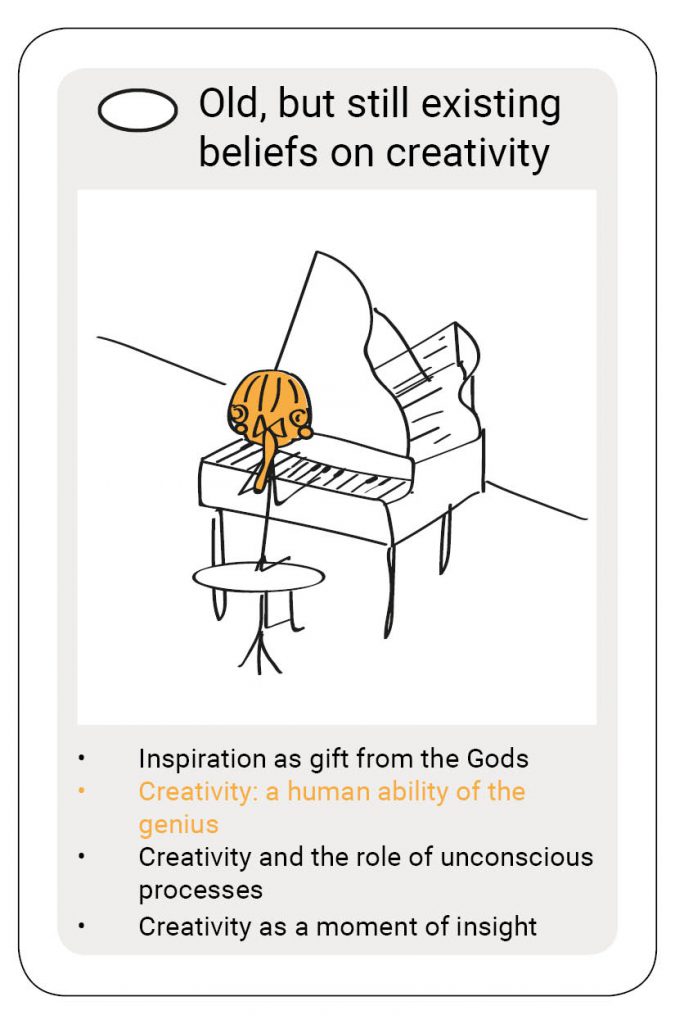 We all believe that Mozart, Einstein, Picasso Da Vinci and so on were geniuses and very creative. Why is that? And why don’t we believe we geniuses ourselves? I need to cover two topics and 2000 years in one article. First, the ‘fact’ that we see creativity as human ability and second why this ability is related to geniuses. This is quite a challenge. I try to be as precise in dates and references as I can. For the historical experts among us, please contact me if I made a mistake.
We all believe that Mozart, Einstein, Picasso Da Vinci and so on were geniuses and very creative. Why is that? And why don’t we believe we geniuses ourselves? I need to cover two topics and 2000 years in one article. First, the ‘fact’ that we see creativity as human ability and second why this ability is related to geniuses. This is quite a challenge. I try to be as precise in dates and references as I can. For the historical experts among us, please contact me if I made a mistake.
We start where we left of in Ancient Greece to explain the origin of the word genius. Then we move through the Middle Ages in which the idea that creativity is a human ability was conceived. This idea was born in the Renaissance, went to school in the Age of Enlightenment, went to puberty in the Romantic period, grew up in the Industrial Revolution and is currently growing old in our Digital Revolution.
It is in the Romantic Period where our current idea on the relation between creating as human ability and the genius meet each other. We will end this article there.
Because I have to cover 2000 years of history, I need to make choices in what to tell. I’ll focus is on the events and inventions that influenced the way we still think about creativity. There are some great fun facts for birthdays in this article as well.
The origin of the genius
In Ancient Greece and in Rome you were not a genius, you had a genius (Simonton, 2011; Weiner 2000). And everyone had a genius. That should not be interpreted as all of us having a pocket version of Leonardo DaVinci on his shoulder. That would be great! But no.
A genius was a guiding spirit and it was the genius that made a man distinguish himself from other men (Simonton, 2011; Weiner 2000). The female variant was called Juno (Simonton, 2011), or Iono (Weiner, 2000).
We will see how this interpretation of the genius changed over time. To find out we need to shift our focus to creating as human ability. The idea that people create is logical to us but no so much to people that lived 2000 years ago.
God creates. Humans make.
In Ancient Greece and in Rome creating was not attributed to people. Creating was a divine activity, preserved for God. In Jesus’ time, the Latin word for ‘creation’ was used to describe the creations (duh) of God or the Gods.
The word ‘ars’ or ‘art’ was used for human making. And ‘making’ was nothing more than an effort to imitate the ideal world, remember Plato (CQ8). All that people make was caused by the Gods, as a person, you had no influence. Aristotle did give some credit to the human ability in the making of art. But creation should be left to God or the plural form, the Gods, depending on when and where you lived exactly.
Middle Ages
Christianity is the main reason why creation remained attributed to God and not to humans. Tradition doesn’t like change. And traditions were important in Christianity. The word ‘tradition’ is the Latin meaning for ‘handing over’. The Bible claims that Jesus handed over the keys to the Church to Peter (Weiner, 2000: p43). As Roman church ruled, traditions were celebrated and change went slow. So we have to wait for a millennium for something worth mentioning to happen. Of course, that is exaggerated, something must have happened in a thousand years?! Sure thing.
St Augustines (354-430, a big influencer from the Middle Ages) wrote Confessions and invented the autobiography (probably without realizing it). According to Weiner (2000, p45), Augustine writes:
‘God is the true Creator […]’. There you have it again.
St Francis of Assissi (1181-1226 the second big influencer from the Middle Ages) boosted the idea of the ‘importance of the individual as a dignified creature of God’ (Weiner, 2000: p47).
Thomas of Aquinas (1225-1274, another big influencer from the Middle Ages) uses Aristotle’s notion of God as the ‘first cause’. All we make, even those great artistic works that can be found in so many churches, all serve to honor God. (Weiner, 2000 p45):
‘the purpose of artwork was to imitate [there is the word again] and reveal the sacred and the ideal realms’
In other words, it is OK to make ‘new’ things, as long as it had the purpose to get closer to God. If anything else you would have the inquisition on your tail. According to Weiner (2000), the Muslims and the Jews were more free in the interpretation of their holy books. Roman church was pretty strict. However, Thomas of Aquinas is also known for giving people the right to fight against unjust rule.
The Anonymous Artist
In the context described above, it might not come as a surprise to you that there was no room for the artist as an individual creator. Like I argued above, the purpose of the work was not to show human talent but to honor God.
Also, these makers were seen as ‘mere craftsmen’ and they did not receive a special status we give (or maybe gave) to artists. For these two reasons we also see no signatures on artwork before +/- 1400. And there is a third reason why we don’t see signatures on paintings before +/- 1400. These artworks were often made by collectives, so not one artist, in particular, could be appointed as the maker (Weiner, 2000).
Change is coming…
Painter Giotto innovated painting by painting his figures in a way that the viewer would feel part of the painting. The perspective of the viewer, of the painting, was never considered before. New city-states were formed in Italy. Marco Polo’s explored China. Humanistic scholars like Erasmus came to the stage, who found inspiration in Ancient Greek ideas to counter the tradition of the Church. (Weiner, 2000).
A lot more happened between, let’s say 1250 and 1500. Let’s not forget the invention of the book press, talking about impact and social innovation… And I’m sure there is much more interesting stories to tell, but not right here, right now. What is important for us is that all these small and big inventions and events led up to the Renaissance which is where our fundamental views on science and creativity were (re)born.
Il Rinascimento!
Everything sounds better in Italian. And it was an Italian who gave us the term Renaissance. In 1550 Giorgio Vasari* wrote: The lives of the Artists and coined the term Il Rinascimento (Weiner, 2000: p57; Isaacson, 2017: p7). In 1550 artists were worth writing about, something that would have been unthinkable a hundred years before that. It was in this period that artists started to demand some r.e.s.p.e.c.t.. They were more than the only craftsman, they were creators! Yeah!
*Vasari returns more often in biographies on DaVinci because he was one of the artists Vasari wrote about. But apparently, according to Vasari Michelangelo was the greater creator than DaVinci. But Michelangelo wasn’t a very nice guy whereas Leonardo was a very gay man in all meanings of the word. You should read Isaacson’s (2017) biography on Leonardo Da Vinci if you like these sorts of fun facts and of course if you want to know all about Mr. Creativity himself.
When did people start ‘creating’ instead of just ‘making?
Even though the relation between human making and divine creating became more of an issue in The Renaissance it took another generation, or maybe two at those times, to relate creating to humans. Here comes another fun fact.
In 1589 George Puttenham, an English writer and literary critic, was the first to write about creating in relation to humans** (Abrams, 1953, p274):
“If poets, said Puttenham, be able to devise and make all these things of themselves, without any subject of without verities, then they be (by manner of speech) creating as gods.”
**Is this really a fact? I have some frustrations with articles or blogs that take for granted anything written in a scientific article. Nuanced suggestions by honest researchers become ‘solid facts’. So I did some source searching for this fun fact. This quote comes from Weiner (2000, p55) whose book I’ve been using in many articles for the Creativity Quartet. Weiner is also quoting, he is using Abrams (1953, p.274). Unfortunately, I don’t have access to this source, but there is always Googlebooks (even though I dislike Google as a company I love Googlebooks). And I find the quote on the right page (good job, Weiner). There is a footnote at the quote. Looking up the footnote I find that Abrams draws his conclusions from Puttenham’s ‘Art of English Poesy’ which was part of an edited book by Smith in 1936: ‘Elizabethan Critical Essay’. And 1936 is not 1589. You can read the Art of English Poesy (1589) online in a 2007 edited version. I’m not a historian nor expert in English literature. With this example, I want to showcase that it is time-consuming to find the source, not even mentioning understanding a source from 1589. And this is how ‘facts’ change over time due to interpretations of interpretations. For now, I’m going for Abrams (1953) and I am not questioning if there is another source that might have made the connection between humans and creating before Puttenham. Moving on…
The reason for this explicit use of the word create in relation to humans could be a result of the enormous output of art, literature and scientific progress in this period (Weiner, 2000: p56). We see the same sort of thing happening in the Industrial Revolution as the word creativity came to stage (see CQ2).
Another fun fact for engineers. Not only artists but also engineers gained respect and acknowledgment in the Renaissance. They were praised for their ‘ingenio’, which means ‘natural genius’ in Latin (Weiner, 2000: p58). In Dutch, the word engineer translates as ‘ingenieur’. Being an engineer myself I feel blessed that I have a natural genius. Maye Leonardo Da Vinci is sitting on my shoulder, haha.
The Renaissance gave us the idea that creation was not only for the gods but we as human beings were also creators. Moreover, creating was not only for artists but also for engineers or even rulers. For those who were excellent in creating they used the term ‘genio’ (Becker, 2011: p70). We see that the Ancient Greek definition of ‘genius’ was starting to change…
Empirical method
Leonardo (we are on a first-name basis, Leo and me) was a great observer. For example, he observed, and cut open, bodies to understand human muscles. Oh oh, the blasphemy! In his opinion, only by understanding how the human body functions he would be able to paint emotion (Isaacsen, 2018). It was Gallelei Gallilleo who used the method of observation as a learning tool in science. And it was Sir Francis Bacon who described observation as a learning tool into a scientific method in Organum Novum (1620)***.
Bacon was inspired by Aristotle who separated scientific theory from practical experimentation. However, according to Bacon, there shouldn’t be a separation between the two. The practical experimentation of trial and error should complement scientific theory (Weiner, 2000).
***You can actually download his book in English from 2017 here. How awesome is that! The start of how we practice science in 130 pages, right in your face. Good luck!
Nowadays we take the opposite approach: scientific theory complements practical experimentation. As a society, we don’t believe things we cannot prove empirically. Bit of short-sided from us, if you ask me. As with any societal belief, history explains it all! And With Bacon’s empirical method we move to the next era, the era of Enlightenment!
Enlightenment
I’m going to be short on the Enlightenment. So much happened, so many people influenced our ways of thinking. Of course, those foundations also influence the way we think about creativity, even if it is indirectly. Quick summary:
Creation of wealth became an issue. The individual became more and more important. The role of labor changed. Thomas Hobbes, John Locke, Adam Smith, Jean-Jacque Rousseau, Karl Marx, founded the way we think about democracy and economics.
The empirical method and search for the natural laws of the Universe (Weiner, 2000: p67) were developed further. Newton, Leibniz, Keppler discovered gravity and rules of motion.
Philosopher Immanuel Kant changed our idea of time as a linear something. The idea that we can look back and look forward is pretty much a fact for us. But before the Enlightenment, we had a more circular approach towards time. Henri Bergson has an interesting approach towards time as duration and I think the Mayas had three timelines that moved parallel to each other: the past, the present, and the future. Yes, there are other options than our linear approach towards time. Back to the Enlightenment.
In one sentence the main belief in the Age of Enlightenment was that ‘Human reason and action can transform the world’ (Weiner, 2000: p66). In, give or take, two centuries the idea that the humans were individuals with cognitive abilities to create took serious shape.
We top of the Enlightenment the French Revolution in 1789. As an excuse to overthrow kings and to get rid of the feudal system, Napoleon turned Europe into a slaughter field. Quite obviously this was not what people wanted from the Enlightenment and some started to rebel against this idea of Enlightenment. Voila, the Romantic Period is born.
The Romantic genius
Away with all this reason and machinery, hail to emotions and imagination! That is my summary of the Romantic Period. More serious definition (Becker, 2011: p69):
‘Romanticism: a literary, artistic, and philosophical movement that flourished in Western society over a period from the late eighteenth to mid-nineteenth century but with continuing influence today. It is characterized by emphasis of individualism, imagination, a deep appreciation of the beauties of nature, the exaltation of emotions over reason, and a preoccupation with the exceptional figure in history, such as the genius, the gifted artist and the hero more generally.”
Since the Englightenment was a period of reason, it was intellect that separates the extraordinary from the common. In the Enlightenment period that genius ‘an educated individual whose abundant imagination was properly tempered with good taste, training in the classics and an appreciation for the masters.’ (Becker, 2011: p72). Imagination was a bad thing because it blocked or interfered with reason.
Because only intellectuals were seen as geniuses, painters, sculptors, writers, etc. felt deprived of their special status, they once had during the Renaissance. And so, these artists (especially literary artists) began to revive the Ancient Greek idea of divine inspiration and madness (see CQ8):
‘It was the aura of mania that endowed the genius with a mystical and inexplicable quality that differentiated him from the typical man [..].’ (Becker, 2011: p71).
These Romanticists argued that is was a good thing to feel depressed, because it meant that you were possessed and was only given to true geniuses. Madness is what makes the genius. The supposed relationship between insanity and creativity has its foundations in the Romantic period. Whether there really is a relationship between the two remains doubtful.
The Romantic literary figures had another problem. They had to live by the rules from academia and/or their masters. As originality became more appreciated, these artists still had to fit the thinking of their bosses. That must be recognizable to at least some of us. In order to get rid of these opinions, the Romanticists had to redefine ‘the genius’.
So what did they do?
They flipped the meaning from the Enlighteners around:
The genius is not the one that is the most intellectual and that can best suppress imagination. No. The genius is the one that is best at using imagination and is able to forget reason.
Becker (2011, p72) quote Schiller (poet and philosopher) and the quote is too good not to requote:
“It is not well in words of creation that reason should too closely challenge the ideas that come thronging to the doors. Taken by itself, and idea may be highly unsuitable, even venturesome, and yet in conjunction with others, themselves equally absurd alone, it may furnish a suitable link in the chain of thought. Reason can not see this… In a creative brain, reason has withdrawn her watch at the doors, and ideas crowd in pell-mell.”
Does that quote remind you of something? Like some brainstorming rules? If not, don’t worry, we’ll cover brainstorming in August.
So, who won?
I think the Enlighteners won, the Romanticists lost. Let’s face it, we believe in reason. Regardless of the ‘fact’ that we associate art and creativity with an expression of emotion. It is less important to us, as a society than rational thinking. The cognitive brain is more important than the gut feeling. Though there is a strong movement against all these rational ways of thinking. Newton is already proven wrong, Einstein might be next. Quantum theory is starting to explain why Chinese healers or Shamans might have been right all along (how hilarious would that be).
Conclusions
What is a genius?
In Ancient Greece, a genius was a personal guiding spirit. As creating turned into an activity not only preserved for God but also for humans, the definition of a genius changed. Instead of a guiding spirit, genio was something that you could use.
With the Renaissance and the Enlightenment, the genius became a name for people that showed remarkable intellect. Slowly, a genius turned from something you have into something you are. And if you were a genius you had great creating power (and thus creativity, even though the word didn’t exist yet, see CQ2).
With the Romantic Period as a reaction to all this reasoning that came in the Englightenment, the definition of the genius change again. They said that a genius is someone who is great at imagining.
Anno 2020, the idea of a genius is a combination of the Enlightenment definition of a genius with the Romantic definition of a genius. Don’t we think a true genius is someone that is able to imagine and/or reason?
Einstein was not only the creator of the Relativitims theory, but he was also genius with words, resulting in many quotes many of us often use. In this context his following quote is suitable:
“Imagination is more important than knowledge. Knowledge is limited. Imagination encircles the world.”
Can we say that Einstein was a Romantic figure (in the non-love sense of the word) excelling in an Enlightenment-based society?
When can we say: I am a genius
Of course, we can say it anytime we like, but when will other people not laugh at you when you say it? If geniuses are able to combine imagination and reason, aren’t we all geniuses? Because of the ability to imagine something that is not in the ‘real world’ and connect it to the ‘real world’, isn’t that what separates humans from other animals?
In scientific research, Francis Galton first tried to define the genius scientifically (I’ll get back to this in chapter 4). You have to showcase some great results of imagination and/or reason to be allowed to call yourself a genius, at least according to Galton.
And I guess this belief still accounts for today. We don’t think of ourselves as geniuses. We only allow this stamp for great accomplishers, the Mozarts, the Einsteins, the Shakespeares, etc. But if creativity is for everybody, then maybe geniuses as well. I still like the idea of having a pocked Leonarda Da Vinci on my shoulder.
That was a long story but still short history of basically the development of Western society. Next week we slow down and turn our heads inwards to our unconsciousness. We’ll see that also Freud had a major influence on our perceptions of creativity. You will find the cards for the next weeks below.
Willemijn
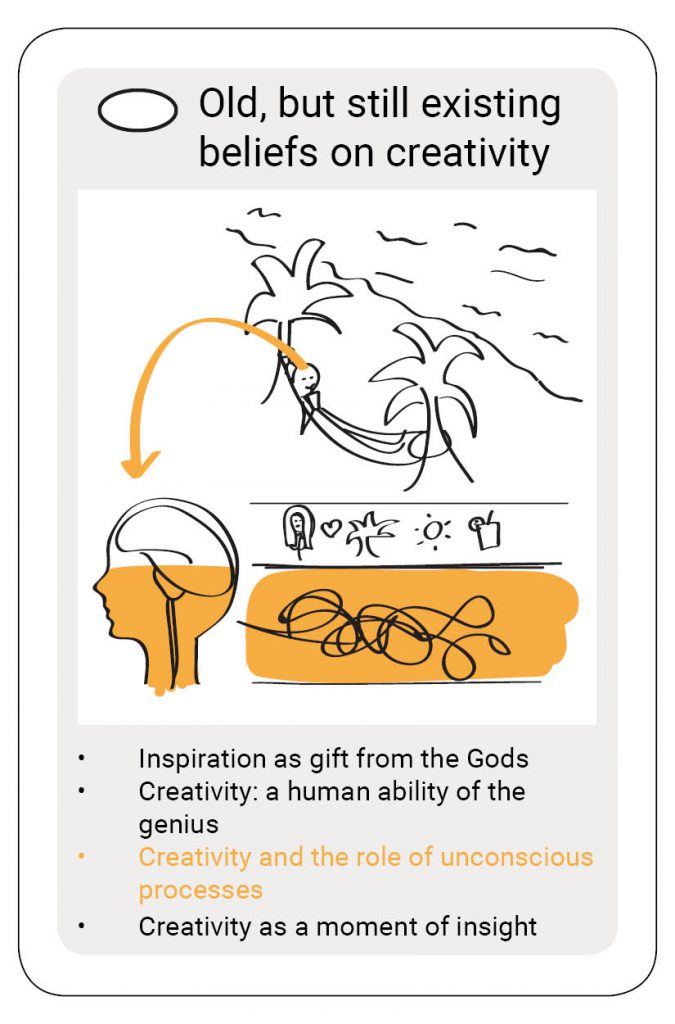
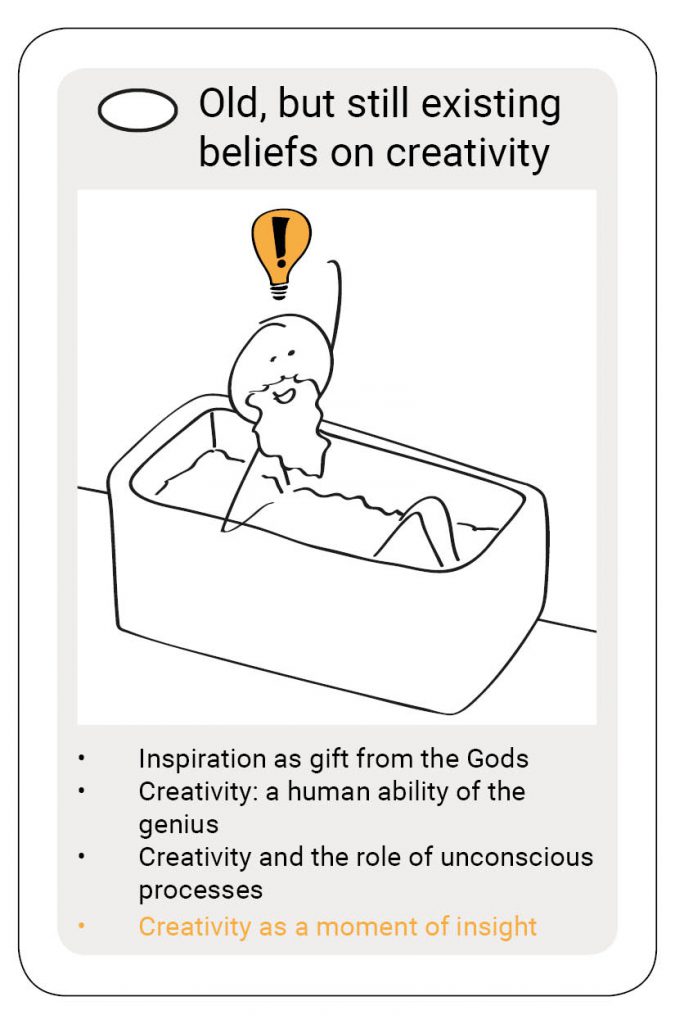
The creativity quartet combines my knowledge of and experience with creativity. Just like any other person I have experience with creativity as long as I live, but more deliberate when I started studying Industrial Design Engineering in 2001. I have over fifteen experience in facilitating and training creativity. My interest in creativity theory started in 2015. And I’m currently looking into doing promotional research on creating an overview of creativity theories. What you read in the articles are my interpretations of the truth. If you have something to add to that, please do so. Ending with my favorite quote on creativity by Maya Angelou:
“You can never use up creativity. The more you use, the more you have.”
References
- Becker, G. (20110. Mad Genius Controversy. In Runco, M. A. and Pritzker S.R. (Eds.). Encyclopedia of Creativity. Second Edition, Vol 2. pp. 69-74. London, UK: Academic Press.
- Isaacson, W. (2017). Leonardo da Vinci. New York, NY: Simon & Schuster.
- Simonton, D. K. (2011). Genius and Greatness. In Runco, M. A. and Pritzker S.R. (Eds.). Encyclopedia of Creativity. Second Edition, Vol 1. pp. 564-570. London, UK: Academic Press.
- Weiner, R. P. (2000). Creativity & beyond: Cultures, values, and change. Albany, NY: State University of New York Press.
Tags:
SUGGESTIONS FOR FURTHER READING
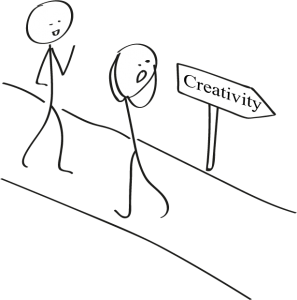
CQ6: Creativity: 3 reasons to love it & 3 reasons to hate it
Last year’s Summer I was at the Creativity Conference in Oregon. I was triggered by the word Cranxiety* introduced by Adam Green who does research on
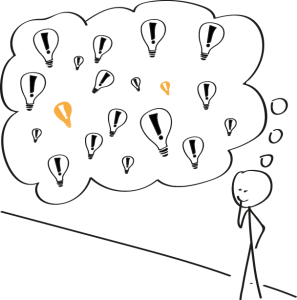
CQ4: No.1 WRONG assumption on Creativity
In the previous two articles, I explained the Western social and economic landscape in which creativity had a chance to become a valuable ability. Thi
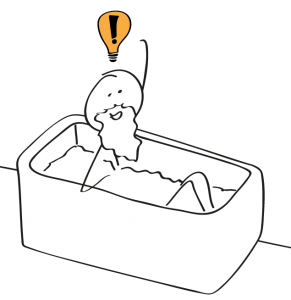
CQ11: Eureka!!!
Do you know that feeling? That feeling that you found it, that final piece of the puzzle. That puzzle piece that makes everything fall into place. Tha
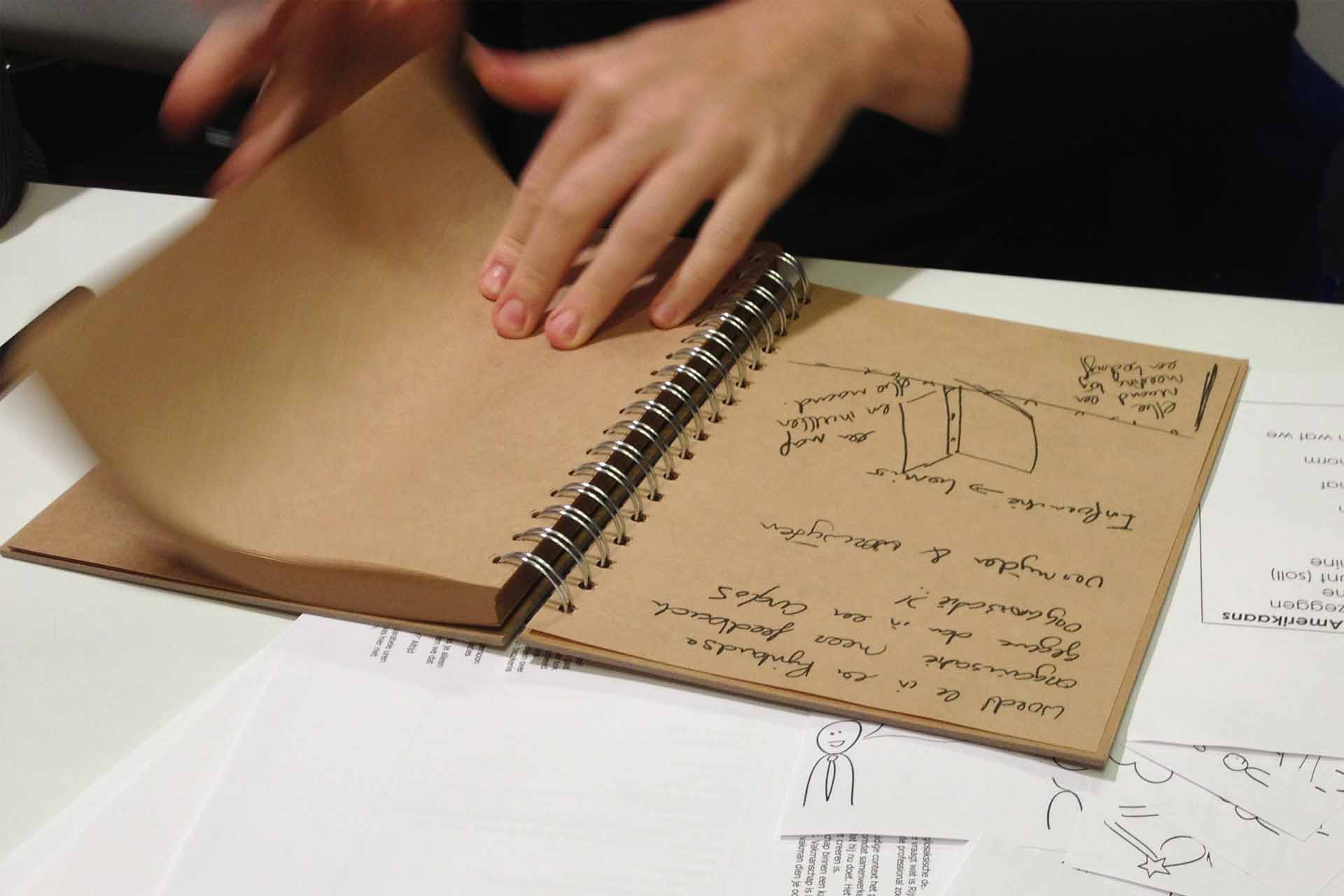
Title photo
Inspiration for inspiration
Would you like to receive the Creativity Quartet 2020 as inspiration? Think about how you can inspire us. For example, we have a coffee, you send us a book or article, link us to a person, point us to a website, etc. Leave your name and e-mail address and we’ll contact you for further information. We will not use your e-mail address to send you offers and won’t give away your information to other parties.



